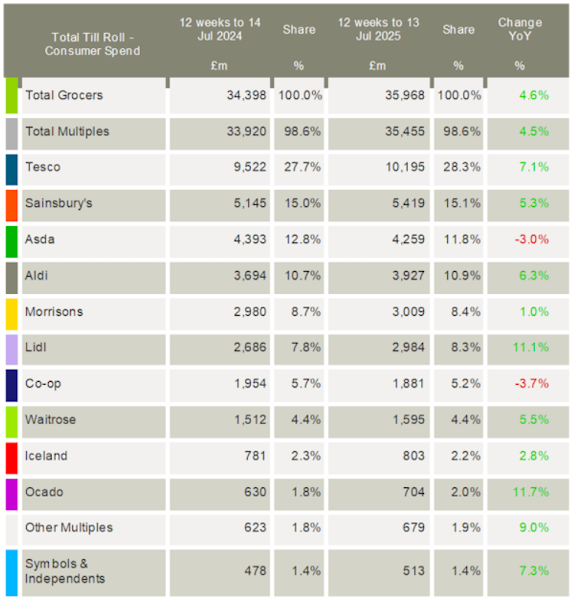Latest figures from Worldpanel by Numerator: UK take-home sales up 5.4% during the 4 weeks to 13 July compared to 2024 (accelerating price inflation, with the highest level since January 2024 at 5.2%).
The average household spends £5,283 each year at supermarkets, which means the latest rise could add £275 to people’s grocery bills if their shopping habits stay the same.
Fraser McKevitt, head of retail and consumer insight: “Own label products, which are often cheaper, continue to be some of the big winners and, in fact, sales of these ranges are again outpacing brands, growing by 5.6% versus 4.9%."
Inflationary worries are not only changing what we buy food but also its preparation (simpler meals to save money, almost seven in ten dinner plates include fewer than six components).
McKevitt said: “Innovation is absolutely vital to help grocers keep up with new trends and make sure they’re meeting shoppers’ needs as behaviours and priorities shift."
The drinks aisle:
Iced coffee has soared in popularity in recent years, and with summer temperatures rising, sales were up this month by 81%.
Kombucha drinks sales more than doubling over the latest four weeks vs 2024.
Individual retailers:
Lidl reached a record high market share this period at 8.3%, gaining 0.5 percentage points as it attracted more than half a million new customers to its stores.
Aldi sales up 6.3%, share up to 10.9%.
Tesco share 28.3% after sales grew by 7.1%, the fastest rate since December 2023.
Sales at Sainsbury’s increased by 5.3%, raising its market share to 15.1%.
Matching its previous share high of 2.0%, Ocado was again the fastest-growing grocer in the UK. Its sales rose by 11.7%, exceeding the overall online market growth rate of 5.7%.
Over the past 12 weeks, online accounted for 12.0% of all sales at the grocers, with 23% of households making at least one virtual shopping trip.
Meanwhile, grocery sales at M&S were 6.5% higher than a year ago.
Spending through the tills at Morrisons nudged up just 1.0%, with its market share falling to 8.4%.
Despite its turnaround efforts, Asda’s share of the market slipped to 11.8% after a 3.0% fall in sales.
NamNews Implications:
- Consumers are patently being affected by the 5.2% inflation ‘peak’ (and more to come)…
- …in terms of more savvy food spending and eating carefully to conserve cash.
- Temporary moves (like brand to own label equivalents)…
- …may prove difficult/expensive for suppliers to reverse.
- Innovation in some categories may help.
- Lidl continues to find top of mind for retailers and suppliers (raising questions re their role in trade strategies?)
- Meanwhile, the discounters’ joint share of 19.2%…
- …if not raising concerns, should be.
- By the same token, the falling shares of Morrisons and Asda cast a shadow…






